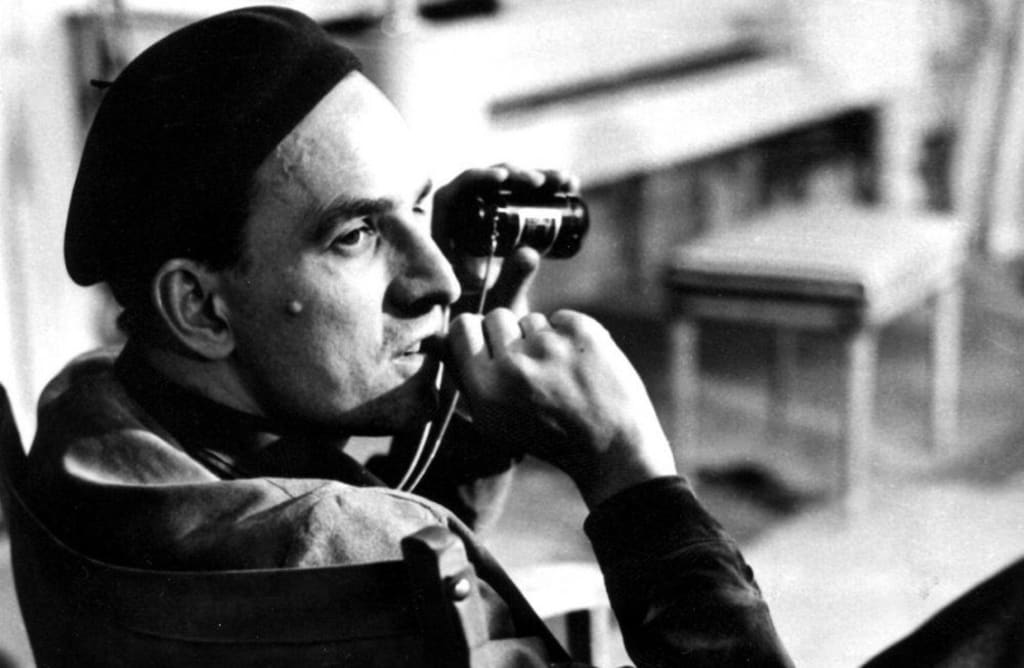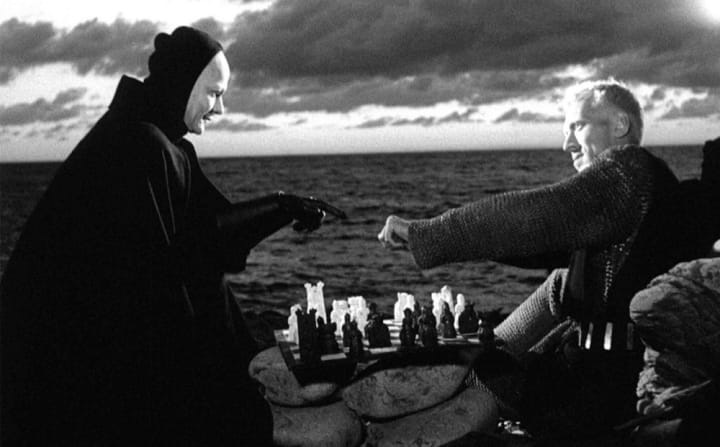
Swedish director Ingmar Bergman's 100th birthday is coming up on July 14 and what better way to celebrate him than to reflect upon his work. Bergman started out as theater director before transitioning over into film directing, though he had always had a knack for the magic of the silver screen. He talks about how when he was young, he had received a magic lantern projector for Christmas and became enamored with the short animated film that came with it, sticking with him throughout his life.
He got his first attempt at screenwriting for director Alf Sjöberg's 1941 film, Torment. The film became a hot topic in Sweden at the time due to its discussions of the education system in Sweden. This was only a sign of things to come in Bergman's career. His debut feature film was Crisis, released in 1946, which he also wrote. For the next ten years, he continued to write and direct a number of films before becoming achieving fame across the world for his Shakespearian comedy-drama Smiles of a Summer Night, which was nominated for the prestigious Cannes Palme D'or.
What came next were two of Bergman's most famous films, The Seventh Seal and Wild Strawberries, each regarded as art-house classics. Bergman received numerous awards for these films and they launched him into stardom amongst the international film audience. These films contained all of what Ingmar Bergman was, not just as a director, but as a human. The Seventh Seal dealt with the themes of death and questioning of faith, two things that Bergman had long dealt with personally. He used his fears and fetishes to his advantage, putting them out onto the screen for others to see, almost as a form of coping.
Bergman took this theme of religion and implemented it into his next unofficial trilogy of films, known as The Silence of God Trilogy, which included Through a Glass Darkly (1961), Winter Light (1962), and The Silence (1963). This was a director displaying some of the most gruesome and true films that had been put on screen at the time, exposing the human condition and behaviors that man will sink to. It was also at this time that Bergman had begun working with his most frequent collaborator, cinematographer Sven Nykvist, who would go on to shoot all of Bergman's films.
In 1966, Ingmar Bergman released his world-renowned film Persona, starring Bibi Andersson, his former lover and collaborator, and Liv Ullmann, his soon-to-be lover and collaborator. Persona broke ground as being a highly experimental film for audiences in the 1960s. It contained themes of adultery, identity, and even nuclear warfare. Audiences were shocked and confused by the film, to this day not at all sure as to what the film's message is entirely about. It is a jarring film that lets the viewer know that they are watching a film, with its image of a projector rattling at the beginning, or a shot of Bergman himself and his crew at the end. It became a classic in no time, the standard for art-house cinema.
What followed was number of films that saw Bergman's critiques on societal standards, identity, and war. These films would include, Hour of the Wolf (1968), Shame (1968), and The Passion of Anna (1969), his first color film. His 1972 film, Cries and Whispers, was a hit worldwide and earned him a rare Oscar nomination for Best Picture and Sven Nykvist an Oscar win for Best Cinematography.
Bergman later ventured into television, directing the miniseries Scenes from a Marriage, in 1975, starring frequent collaborators Liv Ullmann and Erland Josephson. The miniseries was critically praised and had a sort of cultural impact as it is said the percentage of divorces in Sweden doubled the year of the show's release.
However, in 1976, Bergman was charged with tax evasion and moved to Germany. The case hurt Bergman mentally and monetarily as he suffered a nervous breakdown and cost a number of workers to lose their jobs. He vowed never to work again in Sweden and tried to direct films in Germany, but they did not garner as much success as his previous films. He did, however, come back to former glory with his 1978 film, Autumn Sonata, starring world-famous actress Ingrid Bergman and Liv Ullmann as an estranged mother and daughter.
In 1982, Bergman briefly returned to Sweden to create what some have called his magnum opus, the period drama film Fanny and Alexander. He had stated that this would be his final film and that he would focus more on directing in the theater. Fanny and Alexander became a worldwide hit, something surprising for a foreign film timed around 312 minutes. The film surrounds a young boy named Alexander growing up in the turn of the century Sweden with his sister Fanny, after their father has died and their mother remarries a priest. The film is based very much on Bergman's childhood, even recreating the scene where Bergman received the magic lantern for Christmas.
After this, Bergman had moved to the small island of Fårö in Sweden and lived there the rest of his life. He wrote many scripts and directed theater afterwards, even coming back and directing a short miniseries titled Saraband in 2003, chronicling the events after Scenes from a Marriage. He passed away on July 30, 2007, the same day as famed Italian director Michelangelo Antonioni, whom Bergman disliked.
To this day, Bergman's films live on in more ways than one can imagine. He was one of the first directors to use film as a form of therapy, questioning himself and exposing his true emotions to the screen. Polish director Krzysztof Kieślowski said, "This man is one of the few film directors—perhaps the only one in the world—to have said as much about the human condition as Dostoevsky or Camus." A number of modern directors have cited Bergman as an inspiration, such as Stanley Kubrick, Lars Von Trier, and Martin Scorsese. His technique of approaching film was also very influential, using long takes and close-ups to display emotions when words can not. Ingmar Bergman is canonized in the long line of directors for being more than just a director, but for being a real human being.

The Seventh Seal (1957)






Comments
There are no comments for this story
Be the first to respond and start the conversation.